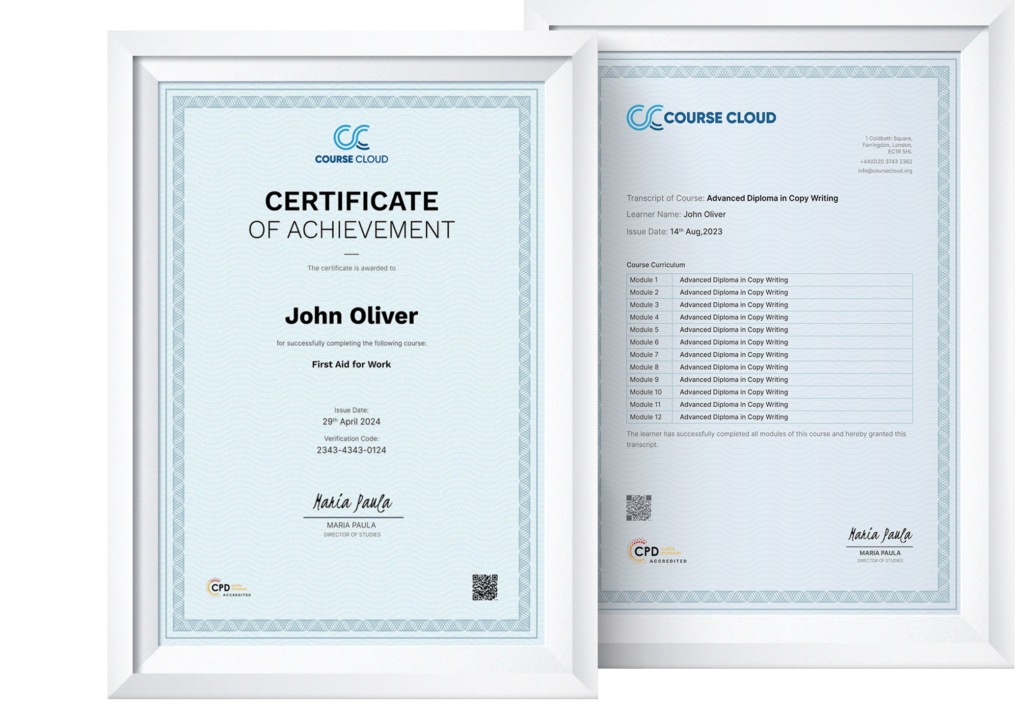Welcome to
Course Cloud
the best place for online learning!
Log In
Sign Up
Don’t have an account yet? Sign Up
Psychological Wellbeing Practitioner Course
Mental health challenges affect countless lives, making the role of Psychological Wellbeing Practitioners (PWPs) more important than ever. The Psychological Wellbeing Practitioner Course equips you with the skills and knowledge to support individuals in improving their mental health and navigating crises.
2 enrolled on this course
( 50% Off Limited Time )

This Course Includes
- 8 Units
- 1 Year Access
- 2 hours, 12 minutes
- Intermediate
- Accredited Certificate






Frequently asked questions
Can’t find the anwser you’re looking for ? Reach out to customer support team.
PWP training typically lasts one year full-time or 15-18 months part-time, combining academic study and practical placement. CourseCloud offers foundational courses like the Psychological Wellbeing Practitioner Course, which prepares you for such specialized training.
The 7 key areas of a PWP's role are: Engagement and Assessment of patients. Delivering low-intensity CBT interventions. Offering guided self-help techniques. Managing patient caseloads. Maintaining records and data for treatment. Providing psychoeducation to support patient understanding. Implementing crisis intervention strategies. CourseCloud’s PWP course ensures you’re familiar with these essential skills.
Yes, PWPs can transition into psychology careers by completing advanced studies, such as a master's or doctoral degree. Starting with the Psychological Wellbeing Practitioner Course by CourseCloud provides a stepping stone into this path.
In the US, psychological wellbeing practitioners earn between $40,000 and $60,000 annually, depending on their expertise and location. CourseCloud’s training can help build the skills required to enter this growing field.
Psychiatric Nurse Practitioners (Psych NPs) earn the highest salaries in states like California, New York, and Massachusetts, with average annual earnings exceeding $140,000. CourseCloud can guide aspiring practitioners through relevant foundational topics.
The highest-paying roles in psychology include psychiatrists, who can earn over $200,000 per year, followed by specialized roles like industrial-organizational psychologists and neuropsychologists. CourseCloud offers beginner-friendly courses to get started in this field.
PWPs do not diagnose but focus on delivering evidence-based, low-intensity therapies. CourseCloud’s course emphasizes the supportive and therapeutic aspects of the role.
Mental health refers to an individual’s emotional, psychological, and social condition, while psychological well-being focuses on overall life satisfaction and functioning. CourseCloud’s training emphasizes both, ensuring a balanced understanding.
PWP training is competitive due to the limited number of funded positions. Completing foundational courses, like CourseCloud’s Psychological Wellbeing Practitioner Course, strengthens your application by showcasing relevant knowledge.
Yes, experienced PWPs can work privately, offering low-intensity therapy and well-being support. CourseCloud’s training provides practical insights to navigate both public and private practice effectively.
PWP interviews typically last 30 to 60 minutes, focusing on scenarios, therapeutic approaches, and handling challenges. CourseCloud’s practical modules can help prepare you for such interviews.
In the UK, PWPs earn between £24,000 and £37,000 per year, with potential for higher salaries as they gain experience. CourseCloud’s course equips you with skills that can lead to these rewarding roles.
While being a PWP can be emotionally demanding due to high caseloads and time pressures, it is also deeply rewarding. CourseCloud’s training includes strategies to manage stress and maintain professional resilience.
PWPs deliver low-intensity CBT interventions, which are simplified versions of Cognitive Behavioral Therapy designed for mild to moderate mental health issues. CourseCloud’s course covers these approaches in detail.
A Level 6 psychology qualification is equivalent to a bachelor's degree or graduate diploma. It provides a foundation for advanced psychology studies. CourseCloud’s beginner-friendly courses can help prepare learners for higher-level training.



 Get Accredited Certificate
Get Accredited Certificate



 ALL COURSES FOR
£49
ALL COURSES FOR
£49

